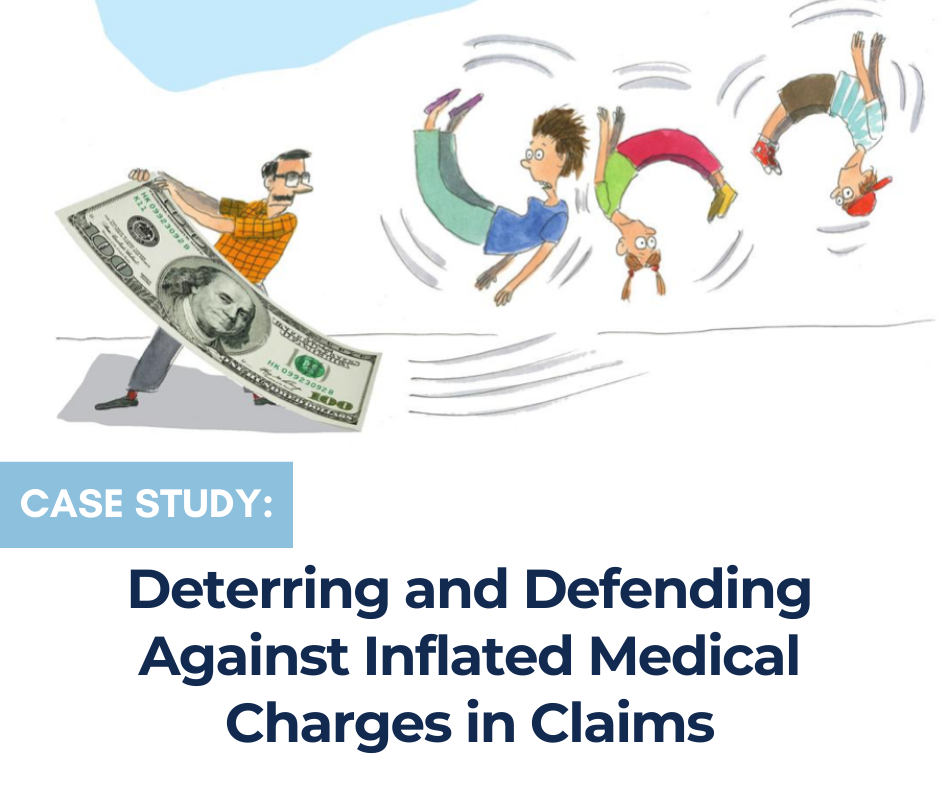
Deterring and Defending Against Inflated Medical Charges in Claims
PartnerSource helps clients take advantage of favorable Texas Supreme Court decisions.
Consider this: The higher the amount of economic damages a plaintiff’s attorney can put before a jury or an arbitrator, the higher the amount a plaintiff’s attorney can argue that a jury or arbitrator should fill in for non-economic damages like pain and suffering, mental anguish and impairment. Fortunately for defendants, in 2011, the Supreme Court pulled the proverbial rug out of from under plaintiff attorneys trying to inflate their client’s past medical expenses in its decision in Haygood v. De Escabedo. Since that time, PartnerSource has been helping clients not only utilize the precedent of Haygood, but also navigate Plaintiff attorneys’ tactics to get around this decision.
Here is a case example. An employee undergoes surgery to repair a rotator cuff tear with medical providers outside of the employer’s Texas injury plan. The surgeon charged $30,000. The anesthesiologist charged $20,000, and the surgery center charged $150,000. The employee was reportedly taken off work for six months following the surgery, resulting in lost wages of $25,000.
With $225,000 in economic damages, the Plaintiff’s attorney argued the jury should award the following amounts for each of the below types of non-economic damages.
|
TYPE OF DAMAGES |
AMOUNT SOUGHT BY PLAINTIFF |
|
Past Medical Expenses |
$200,000.00 |
|
Past Lost Wages |
$25,000.00 |
|
Past Pain & Suffering |
$50,000.00 |
|
Past Mental Anguish |
$50,000.00 |
|
Past Impairment |
$50,000.00 |
|
Future Pain & Suffering |
$20,000.00 |
|
Future Mental Anguish |
$20,000.00 |
|
Future Impairment |
$20,000.00 |
|
Disfigurement |
$15,000.00 |
|
TOTAL AWARD |
$450,000.00 |
What if the plaintiff used his or her health insurance for the surgery? The Texas Supreme Court in Haygood said that if a provider is prohibit from recovering more than its contract rate from the plaintiff, the plaintiff is barred from recovering more than the contracted rate from a 3rd party defendant. So in short, contracted insurance rates, not inflated “billed charges”, are most relevant when awarding damages.
Under Haygood, the damage model looks like this:
|
TYPE OF DAMAGES |
AMOUNT SOUGHT BY PLAINTIFF |
|
Past Medical Expenses |
$25,000.00 |
|
Past Lost Wages |
$25,000.00 |
|
Past Pain & Suffering |
$15,000.00 |
|
Past Mental Anguish |
$10,000.00 |
|
Past Impairment |
$15,000.00 |
|
Future Pain & Suffering |
$5,000.00 |
|
Future Mental Anguish |
$0.00 |
|
Future Impairment |
$5,000.00 |
|
Disfigurement |
$0.00 |
|
TOTAL AWARD |
$100,000.00 |
In the 10 years since the decision in Haygood, PartnerSource has seen a myriad of ways plaintiff attorneys attempt to skirt Haygood, with the goal to put up a big number in economic damages. The most common strategy is for the plaintiff’s attorney to get the provider to agree to render treatment under a letter of protection, rather than have the plaintiff use his or her health insurance. Under a letter of protection, the medical provider’s charges are inflated, unpaid and, therefore, arguably recoverable.
If your first thought when presented with a hospital bill for $150,000 for a rotator cuff surgery would be "I bet they do not charge this to all their patients," you would be correct. To prove that, however, the defendant needs evidence from the provider on what the provider charges patients with health insurance, Medicare, or uninsured patients without a claim against a third party. When defendants would seek such evidence from the provider through discovery, the providers would object, causing employers to have to fight a two-front battle from which many defendants backed off due to the cost.
On May 28, 2021, the Texas Supreme Court again pulled the rug out from under plaintiff attorneys in its decision in In Re K&L Auto Crushers, LLC et al. Through its decision in In Re K&L Auto Crushers, the Court has opened up a path for a defendant to obtain evidence it needs directly from the provider to prove the provider has over-inflated their charges.
More importantly, however, the Court may have deterred the inflated billing practice altogether—and PartnerSource stands ready to help its clients employ this knowledge in their legal defense.
Contact your Team at PartnerSource to discuss ways to deter and defend against inflated medical charges in pre-litigated and litigated claims.
